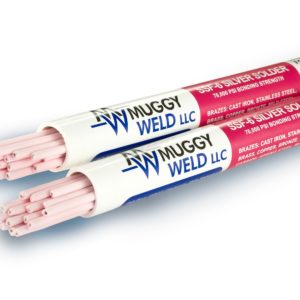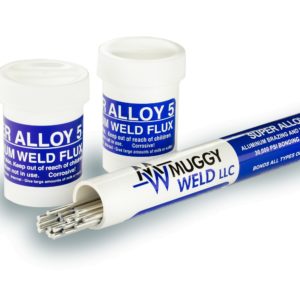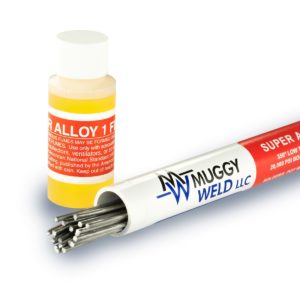Welding Tips and Techniques: How to Braze 3003 Aluminum
What exactly is 3003 aluminum?
3003 aluminum is a non-heat treatable alloy used primarily for sheet metal work, duct work, and chemical equipment, as well as in the manufacture of a wide variety of aluminum parts: gas lines and tanks, refrigerator panels, heat exchangers, and garage doors.
For this demonstration, watch Super Alloy 5 aluminum repair rod and flux kit braze 3003 aluminum plates with weld strength (30,000 psi).
It is important to use a torch designed to adequately maintain even heat while welding aluminum, because aluminum dissipates heat very quickly. We used a trigger start Bernzomatic torch with propane, but an oxyacetylene or oxy-MAPP torch would be equally effective for 3003 aluminum repair.
It all begins with the flux. Super Alloy 5 flux works as an exact temperature guide, liquefying at 600°F and pre-cleaning the parent metal. Simply heat the end of the rod, dip the warm rod in the flux to adhere it, and add to the base metal. As you heat the parent metal, watch the flux to become thin and watery, then add the filler rod as demonstrated.
ProTip: If Super Alloy 5 balls up at the end, this is an indication that the parent metal is not reaching the proper working temperature. Broadly heat the parent metal until the flux liquefies and the filler rod begins to flow.
To ensure a successful weld, be sure to follow all the steps outlined in the video, and broadly heat the base metal rather than the filler rod. Apply heat front to back, side to side, as evenly as possible to ensure optimal flow.
After finishing the repair, remove any excess flux with warm water and a wire brush. The resulting bond can be bent, drilled, tapped, anodized, machined, threaded, or plated.
Tips:
- If the flux turns into a paste in the jar, it has absorbed moisture. It is still usable, but it is more difficult to use than in powder form. Apply as usual, but watch for the flux to turn powder then back to a liquid. Always cap your flux immediately after use
- To increase bonding strength, always add flux every time you add rod
- As soon as the rod begins to flow, the heat should be removed very quickly to avoid overheating the base metal
Disclaimers:
Please visit https://www.aws.org/Standards-and-Publications/Free-Resources/#YourResources prior to using Muggy Weld products, and adhere to all AWS welding safety guidelines.
Further product safety information is available at http://muggyweld.com/safety-guidelines
Muggy Weld LLC shall not be liable for any loss, injury, claim, liability, or damage of any kind resulting in any way from (a) your use of this Site, (b) any services or products obtained from this Site, (c) any errors in or omissions from this Site, (d) the unavailability or interruption of this Site or any features thereof, (e) any content contained on this Site.
MSDS sheets available with purchase from MuggyWeld.com, upon request.
Check Out These Products
-

SSF-6 Silver Solder Rod: Flux-Coated SSF-6 56% Brazing Rod
Price range: $69.00 through $260.00High-Strength, 56% Silver Solder Rod🌡 Melting Temperature 1150 / 621 ⇄︎ Bonding Strength 70000 psi, 482.63 MPa 🔧︎ Sizes Available (in) 1/16 🔧︎ Sizes Available (mm) 1.58 -

Super Alloy 5 Aluminum Welding and Brazing Rod
Price range: $69.00 through $109.00600°F aluminum welding, brazing, and soldering rod. Ideal for aluminum boat repair and cast aluminum.🌡 Melting Temperature 600 / 317 ⇄︎ Bonding Strength 30000 psi, 206.84 MPa

